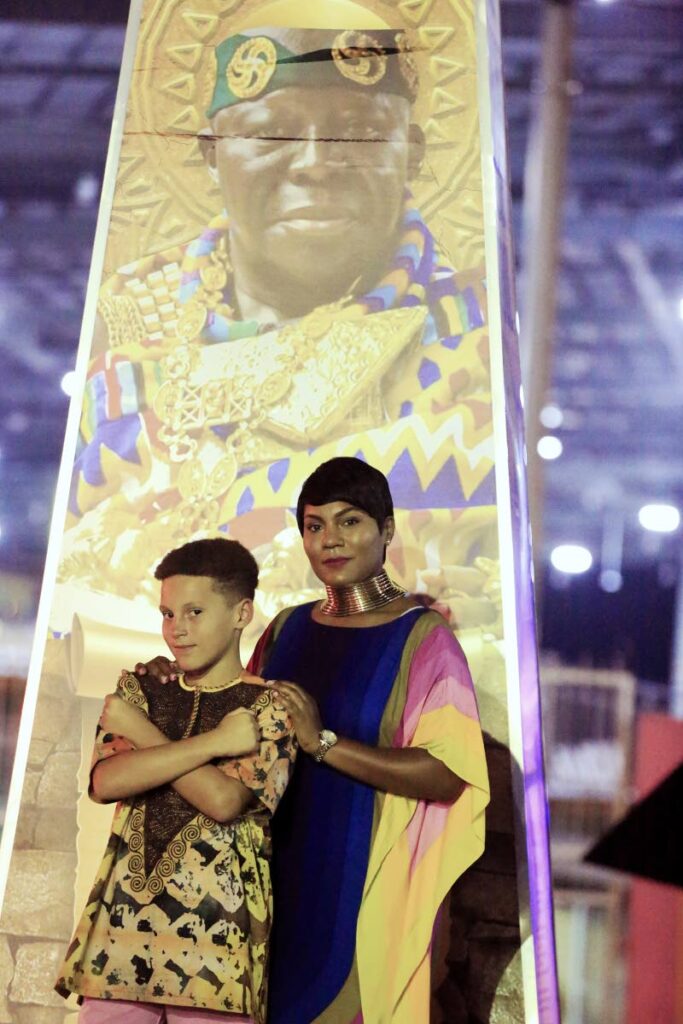Trini-American Keisha Dabrowski returns home to learn about Emancipation

Inspired by her mother, who would always preach “Trini to de bone,” Keisha Dabrowski returned to Trinidad to immerse herself in the Emancipation Day festivities, learn about and expose her son to what their ancestors endured while enslaved in TT.
Dabrowski was born in Sangre Grande – her maiden name is Peters – and was a pupil of Arima Girls’ Government.
She is happily married and her husband is of German, English and Polish descent. Together they have one son, Kristopher.
When she was six, her mother migrated to the US. She said her father had migrated first, but her mother did not even tell her she was going, and Dabrowski only found out when she came home from school that day.
“Understanding what it means to be abandoned…I understand that. And I understand the plight of immigrants and their children. When I became a mum, I realised that was a hard thing for my mother to do, because I could not even think of leaving my son far less to go to a country I knew nothing about.”
She stayed with her aunt for two years and grew to look from her mother’s perspective, which she described as a leap of faith.
At eight, her mother returned and took her to the US.
“We were living in a small one-bedroom apartment in the US, but we had a house with a nice backyard where I used to make mud pies. But I also saw the opportunities...growing up in Brooklyn with a bunch of other immigrants from these other countries who became my community.”
Dabrowski said there were people from the Caribbean and other countries working together and fighting for their children to have a better future.
“I would go to Manhattan and Long Island with my mum. who did domestic work – babysit and clean – and I remember going there and saying, ‘I would love to live in a place like this one day. This is amazing.’ And only seeing white people and thinking, ‘I want to be like them, this is something that only they have.’”
Dabrowski said her mother wanted her to have all the opportunities the US could offer, and after realising that, she stopped at nothing to get it.
She said the pivotal point in her life and one of the other reasons she chose to celebrate Emancipation Day in TT this year was when she learned about Jim Crow.
“Racism is alive and well, and while in TT we will separate ourselves into Indo-Trini and Afro-Trini or Native people, in America, there’s white and everything else.”
While in Trinidad, she never learned about slavery, but it made her wonder about the history of TT.
After realising that the US’s Jim Crow era was just the construction of black identity – that would be used to justify slavery – she decided to do a degree in communications and marketing at the New Jersey Institute of Technology. She jokes and says she went to an engineering college for a business degree.
Her reasoning was if a black identity could be created for negative purposes, then it can be deconstructed and used as a way to educate people.
“Typical to any Trini, I had so much pride in who I am and many times in the US, I say to them, ‘You see me and what you see is a black person, because you have this binary sense of identity, because if you really knew me, you’d know I was a part of a melting pot.’”
Dabrowski said this is because TT has different heritages and everyone celebrates every holiday, whether it be Diwali, Eid Ul-Fitr or Christmas.
She also has a bachelor’s of science in business with a focus on marketing and a master’s in strategic organisational communication with a focus on corporate social responsibility from Rutgers, the state university in New Jersey.

Rutgers – originally Queen’s College – is a research university and is the second oldest in New Jersey after Princeton University. It also has a 58 per cent acceptance rate.
She has worked at Rutgers for around nine years in different positions – executive director for student affairs and chief of staff to the vice chancellor of student affairs – because she always looked for the next step. She was also a part of the creation of the Black History Month curriculum for schools in New Jersey.
Dabrowski said she got a phone call in February 2021 from her mother and began giving back to her immediately. She took her shopping, travelling and to dinners, among many other activities.
“One day she was pushing my son in his stroller in my neighbourhood and someone came up to her and said, ‘Hi, I didn’t know Keisha hired a nanny,’ and she said (in her Trini accent), ‘I’m not the nanny, I’m the grandmother.’ She came and told me with so much pride, and she had so much pride knowing her daughter lived in a neighbourhood like this.”
The next time she got a phone call from her mother, it was to say she had stage four cancer. Dabrowski began calling everyone she knew to get her mother the health care she needed. At the time she was being recruited by Johnson and Johnson – the US-based pharmaceutical industry company – to be a part of its health equity platform.
During the interviews, she warned them she would not let the company settle for the bare minimum and be comfortable.
She told them, “People are dying…my mum is dying and she's dying because of health inequities. When I asked my mum, ‘How did we get here?’ She said, ‘When I went to my doctor, he was rough with me, so I stopped going for my Pap smears.’”
Dabrowski said her mother told her it could have been because her thick Trini accent made the doctor frustrated.
“I decided that if I couldn't save my mom's life, I was going to save other people's moms' lives.”
She said she never wants anyone to feel the hurt she felt and continues to feel to this day, as there were many other experiences she wanted her mother to have with her.
“One of my best memories with her was taking her to Hawaii, because she said she had never been. We flew first-class and I remember getting into the plane and realising that you can lie back in the plane and she said, 'This is what you see on TV,' and she just couldn’t believe it. We stayed at Hilton Hawaiian Village in a three-bedroom penthouse suite and she looked at me and said, ‘Thank you.’”
All Dabrowski said she could think about was wanting to give her mother all of this and more, but the thought that her mother was about to die was in the back of her head.
After her mother died last October, her biological father – whmo she did not grow up with – died shortly after in Trinidad, and she realised he could have survived a heart attack if there were better healthcare.
When he died, that was the first time she had returned to Trinidad in 30 years and Dabrowski said she immediately felt a connection to the island.
After that, she wanted to learn everything about TT and experience everything it had to offer, so she did. Dabrowski took her son with her to every Emancipation Day celebration before their departure on Thursday and tried to gather as much information on TT’s history as possible.
“I’ve been at the Hyatt (Wrightson Road, Port of Spain) and one of the things I have been disappointed in is that there has been no information about Emancipation Day.
"I was in the elevator, dressed in the traditional wear, and a woman asked where I was going. I said I was headed to the Emancipation Day parade and she asked, ‘What is that?’
“How can you have the Commonwealth Games happening right here and they don’t know such a pivotal moment for the island happening?”
She said at the Emancipation Village, Queen’s Park Savannah, there was only one small booth with information about the day when it should have been the main focus. She said more on the history of the island when people were enslaved must be brought out and the importance of Emancipation Day must be shared with pride, to the extent that people leave the island knowing the history of it.

Comments
"Trini-American Keisha Dabrowski returns home to learn about Emancipation"